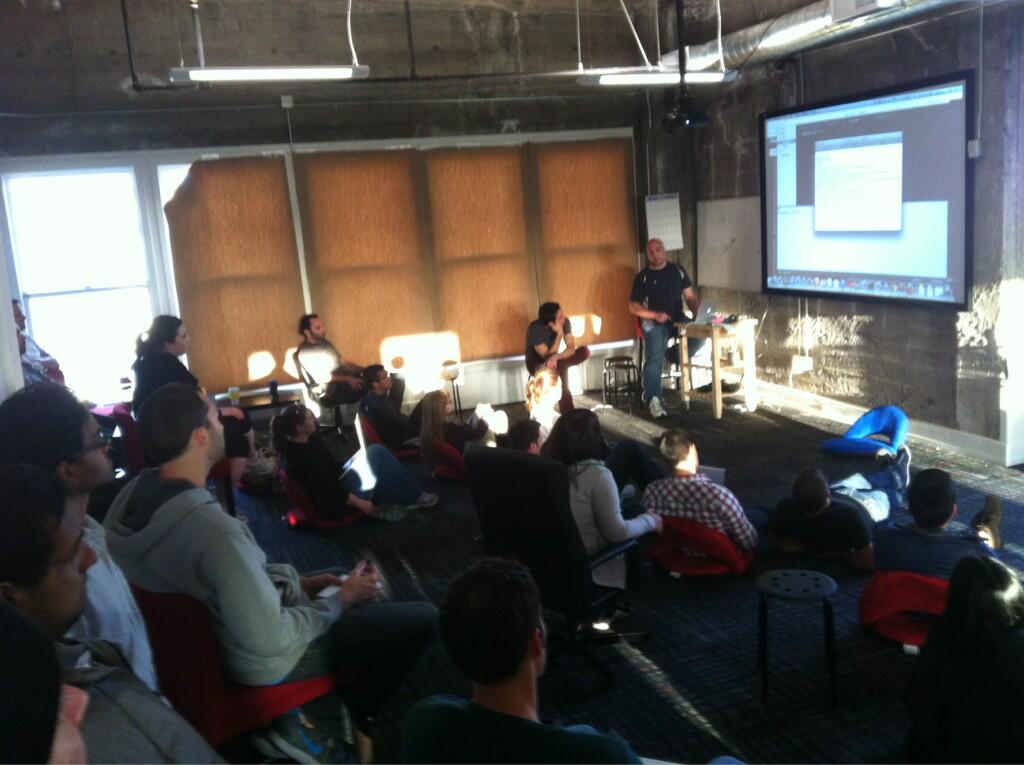These are the notes from my presentation for the new class at Hack Reactor. I know the time constraints make it tough to answer everything, so feel free to ask here.
Choose your own talk
- How to exit or save & exit VIM
- How to enable/disable VIM mode in Sublime
- Sublime short-cuts in general
- Multi-select
- Strip out HTML
- How to learn in general
- Build JS from Sublime
VI Crash course
Why it's worth it to learn at least the basics
- VI is the default editor on most unix machines.
- It's available for almost anything.
- It's keyboard-only and great for cramped spaces.
- It's very fast for proficient users.
- If you don't, it will be completely baffling when it pops up for a git commit
There are two modes: edit mode and command mode
- Edit mode is like a "normal" editor.
- What you type appears.
- Press
escto enter command mode
- Command mode is where the magic (or frustration happens)
- Commands let you do complex things more quickly
- Just a few commands are enough to get around
- With more commands comes more power
- You can repeat any command by entering a number first
- Regex can be used in VI
- There are several commands to return to edit mode (a, i, p, o, etc...)
Basic VI commands
Use your right hand for basic movement:
- h - left
- j - down
- k - up
- l - right
Other movement:
- w - go to the the next word
- b - go back a word
- ^ - go the the beginning of a line
- $ - go the the end of the line
- /foo - searches for
foo - n - goes to the next instance of whatever you just searched for
- N - goes to the previous instance of whatever you searched for
Cutting, pasting and copying:
- dd - delete the current line
- yy - yank the current line into memory without deleting it
- dw - delete from the cursor to the current word
- db - delete from the cursor back to the beginning of the word
- y$ - yank everything from the cursor to the end of the line
- p - paste whatever you last yanked or deleted
Don't forget about using numbers!
- 7k - up 7 lines
- 15j - down 15 lines
- 2p - paste two copies of whatever you last deleted or yanked
- 4w - forward 4 words
- 5dd - delete 5 lines
- 3yyp - make 3 copies of the current line
Switching into insert move
- i - go into insert mode right before the cursor
- a - go into insert mode right after the cursor, AKA append
- o - open up a new line below the cursor and go into insert mode
- O - open up a new line above the cursor and go into insert mode
I lied to you all
VI actually has a third mode
- Hit
esc:, or just:from command mode, to open the command line :wwrites, or saves the current file:qquits and closes the file:q!quits and closes the file even if you haven't saved yet:35goes to line number 35:$goes to the last line in the file:/\d3/regex match 3 digits to use in subsequet finds:s/\d*px/10px/change some number +px on the current line into 10px:4 s/cat/dog/gchange all copies of the word 'cat' on line 4 to 'dog':1,$ s/.*padding.*$//gdelete every line with the word 'padding'
Sublime
Sublime Shorcuts
- cmd + shift + f to do a global find accross all files
- cmd or fn + left/right to go to the beginning or end of a line
- option + left/right to go forward or back a word
- cmd + click to add another cursor for multi-edit
- cmd + d to highlight copies of the curently selected word for multi-edit
- cmd + shift + d to duplicate the current line
- cmd + ctrl + up/down to move the current line up or down
- cmd + j to concatenate the next line onto the current one
The Sublime Command Palette
- cmd + shift + p to open the command palette
- You can install, uninstall, enable and disable packages from here
Packages I like:
- sublime-better-coffescript adds coffeescript highlighting compilation and more
- Vintage and VintageEx - add VI support into Sublime, but no regex support.
- SublimeLinter draws attention to syntax problems
- TrailingSpaces lets you eliminate all the trailing spaces in a file by hitting ctrl + s.
Adding a JS build-system to Sublime
- Open the Tools>Build System menu and select "new build system"
- Name it Node, and a new file called node.sublime-build will be created.
- Add the following data to it and save:
{
"cmd": ["node", "$file", "$file_base_name"],
"working_dir": "${project_path:${folder}}",
"selector": "*.js"
}- Restart Sublime
- Select Node as the build system for your file and hit cmd + b to build from Sublime!
Common command-line tasks
cp -r source destination: copies the source directory and all its children to the target destinationrm -rf dirToDestroy: removes the directory and all its sub directoriesls -la: lists all files including hidden ones and shows them in long formhistory: list the history of recently executed commants!871: re-run the 871st command in the historycat somefileprints out a filecat somefile | grep somewordprints out lines of somefile that include someword
Reference links:
Huge bag of VI tricks: http://rayninfo.co.uk/vimtips.html

Thank you a lot, this is great but please I am stuck. it is like I could not see the node on the built pull down menu as explained in your video. please I need help on this if you can help me out